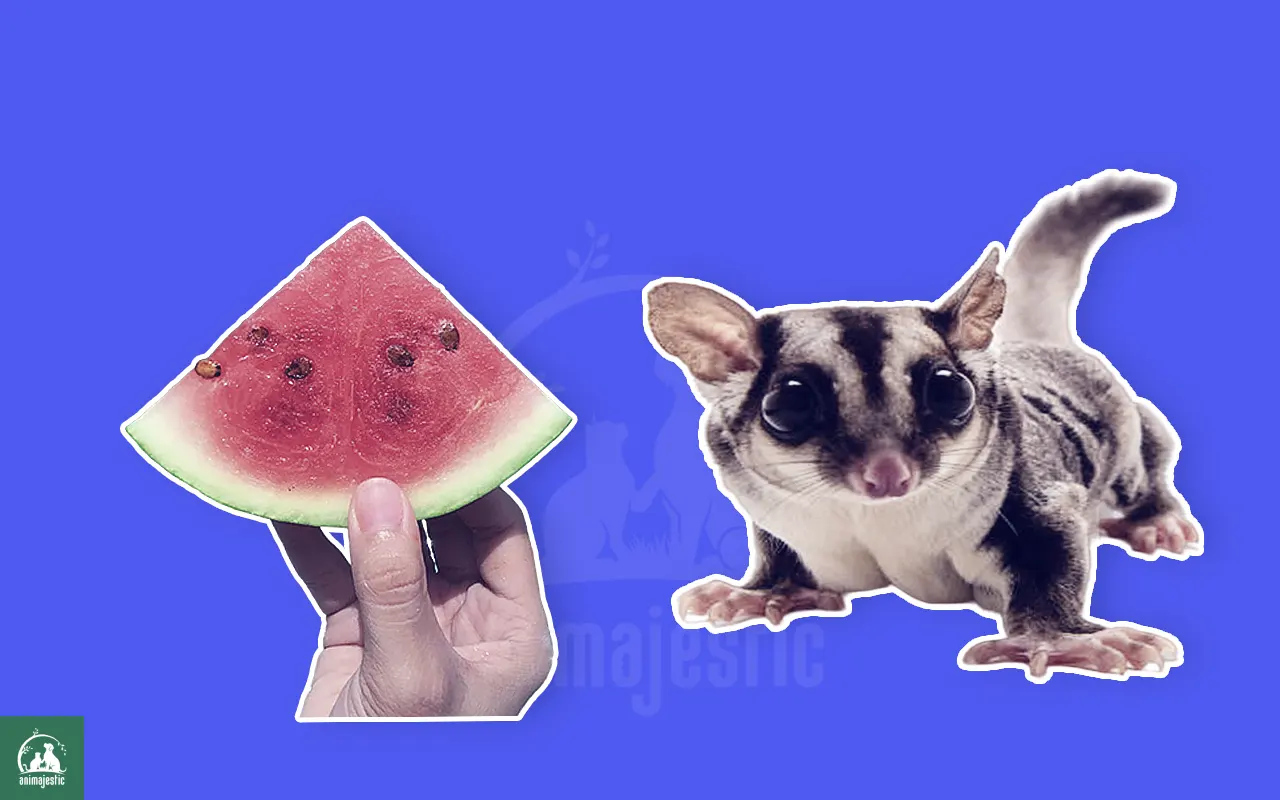Sugar gliders are fascinating and adorable pets, known for their unique ability to glide through the air as they travel from tree to tree.
Their diet is crucial in maintaining healthy and active lives, and as pet owners, it is essential to provide them with the best nutrition possible.
This article has everything you need to make your best decision and I hope you find it helpful.
Can Sugar Gliders Eat Watermelon?
The simple answer to the question is a resounding YES. Watermelons pose no inherent harm to these little creatures and are, in fact, an excellent source of hydration due to their high water content.
However, like with any pet diet, portion control is what matters most. While watermelons are safe, they should never replace the core components of a sugar glider’s diet.
What Does Watermelon Contain?
Watermelon can be a good food for sugar gliders because it has some important nutrients that will help keep your sugar gliders healthy.
- Hydration: Top of the list is the incredible water content of watermelons—nearly 91%—which is fantastic for hydration, especially during hotter months.
- Vitamins: Watermelon is a good source of vitamins A, B6, and C. Vitamin A is necessary for maintaining the health of vision, skin, teeth, and mucus membranes; vitamin B6 is essential for the proper functioning of enzymes in the body and supporting the formation of red blood cells; and vitamin C is a powerful antioxidant that repairs tissues and fortifies the immune system.
- Minerals: Watermelons contain a fair amount of potassium and magnesium. Potassium helps to regulate nerve signals and muscle contraction, while magnesium plays an important role in hundreds of biochemical reactions inside your sugar glider’s body.
Can Sugar Gliders Eat Watermelon Seeds?
Please, your sugar gliders should not eat watermelon seeds. These seeds pose a choking hazard and may cause intestinal blockage if ingested in large amounts. Always ensure that the watermelon is seedless before feeding it to your pet.
Best Practices for Serving Watermelon to Sugar Gliders
Feeding your sugar glider watermelon isn’t just about cutting up a slice and giving it to them. Here are some best practices to adhere to:
- Choosing the Right Watermelon: Always choose ripe, fresh watermelons for your sugar glider. Unripe or overly ripe watermelons could upset their tiny digestive systems.
- Preparation: Remember to chop the watermelon into tiny, manageable pieces to make it easy for your pet to eat. It’s crucial to remove all seeds as they pose a choking hazard.
- Portion Size: Small portions are the way to go with watermelons. Despite its many benefits, watermelon should only represent a small segment of your sugar glider’s diet, which should speedily consist of protein coupled with a mix of other fruits and vegetables.
How Often Should I Feed?
You can include watermelon in their diet once or twice a week, making sure not to overfeed them as excess sugar consumption can lead to obesity or other health issues.
Is Watermelon Always Safe?
Generally, watermelon poses no immediate health risks to sugar gliders. However, there are three crucial factors to keep in mind:
- Sugar Content: Sugar gliders, despite their names, should not consume a diet high in sugar, which can lead to obesity, tooth decay, diabetes, and other complications. So, don’t let the high sugar content in watermelons fool you into overfeeding your pet.
- Choking Hazards: As stated earlier, seeds and the hard rind can be choking hazards, so always ensure these are removed before feeding.
- Pesticides: Wash fruits before cutting to ensure that the watermelon is completely free from pesticides, which can be harmful to your sugar glider.
Can Baby Sugar Gliders Eat Watermelon?
To be honest with you, baby sugar gliders should not be fed watermelon, as their diet should primarily consist of their mother’s milk or milk replacement.
At around 10 weeks old, depending on how awesome they develop, then you can start to introduce them gradually to solid foods, including small amounts of fruit like watermelon.
Safe Alternatives for Sugar Gliders
Aside from watermelon, there are various other fruits and vegetables that you can offer your sugar gliders to keep their diet diverse and nutritionally balanced, such as:
- Apples
- Blueberries
- Broccoli
- Grapes
- Papaya
- Green beans
- Spinach
Remember that a proper diet for sugar gliders includes proteins and nectar substitutes. Consult your veterinarian for guidance on your pet’s nutritional requirements.
Conclusion
Yes, sugar gliders can safely eat watermelon in moderation, provided that you remove the rind and seeds and offer only small portions.
Including watermelon in their diet can add variety and provide them with essential vitamins and hydration. However, be cautious not to overfeed and prioritize a nutritionally balanced diet to keep your sugar glider healthy and happy.
